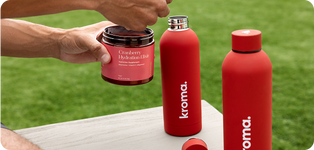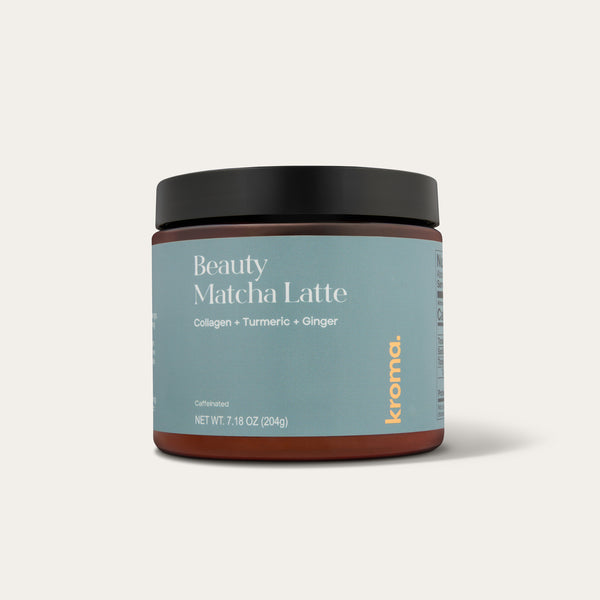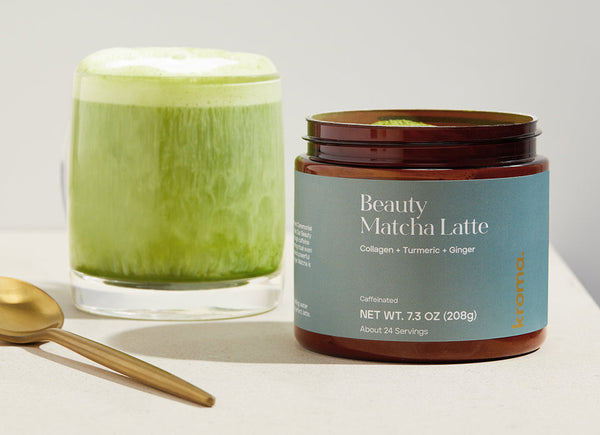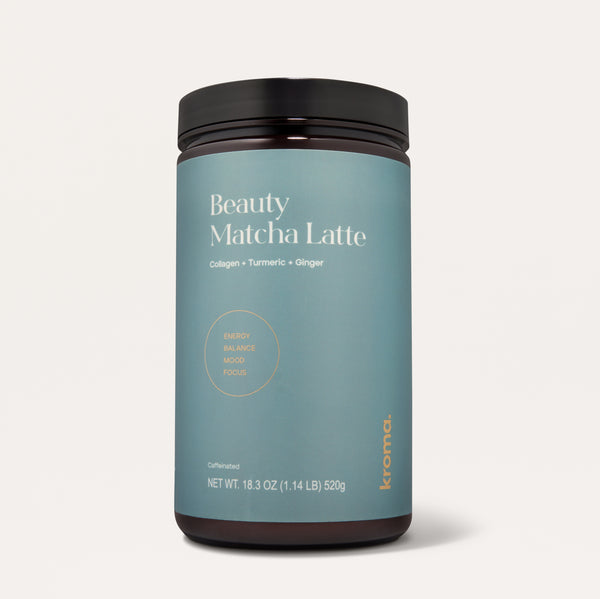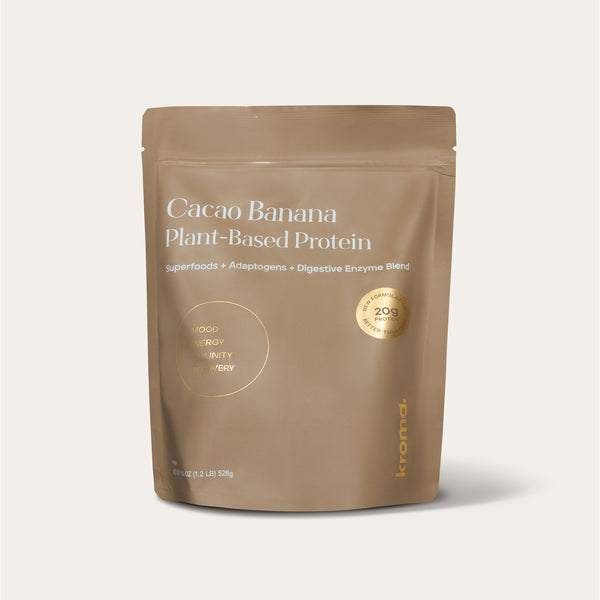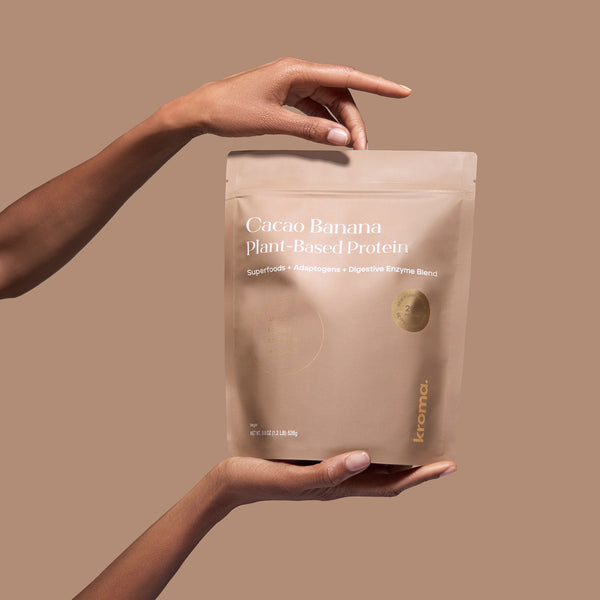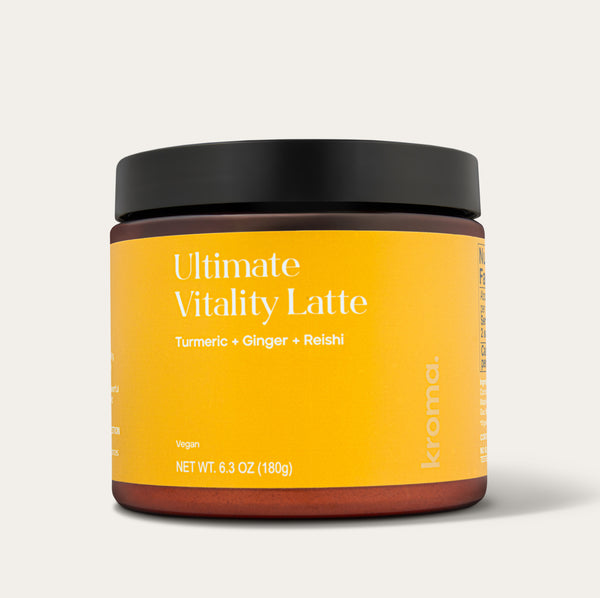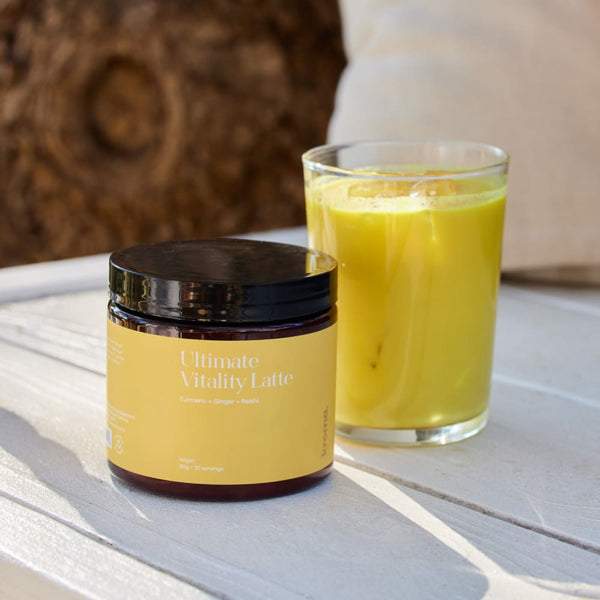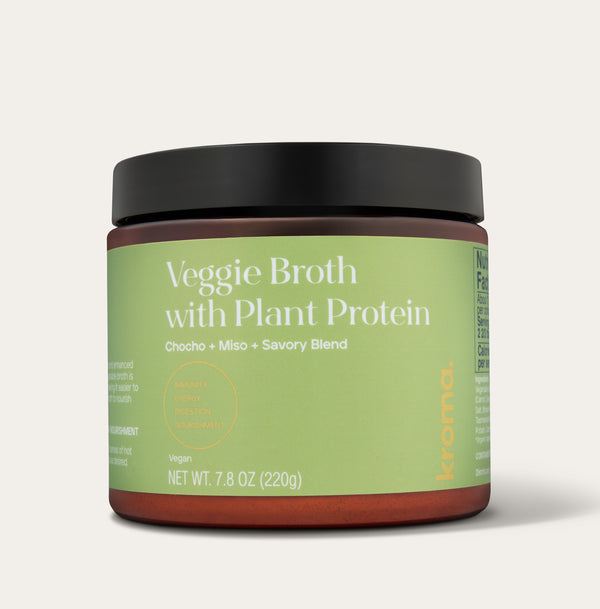Maca is an edible herbaceous superfood native to South America, and it grows high in the Andes mountains of Peru. Maca provides possible health and wellness benefits. This article discusses everything you need to know about maca powder, its health advantages, and how to incorporate maca into your diet.
Looking for a simple way to include more maca in your life? Maca is featured in our 5-Day Reset and our Spicy Passion Latte, and we're about to share ten reasons why!

What Is Maca?
Maca, also known as Peruvian ginseng and Lepidium meyenii, is a caffeine-free, cruciferous vegetable related to cabbage, kale, radish, and broccoli. The maca root is cultivated as a root vegetable and grows in the wild in Peru, Bolivia, Paraguay, and Argentina. It looks similar to a turnip or radish, and the roots are yellow, black, or red. These are the three most popular types of maca.
The maca root is ground into a fine powder and used in recipes for medicinal purposes. Maca is most known for its potential sexual wellness health benefits.
Maca is an adaptogenic herb, meaning it contains compounds that support the body’s physical and emotional stress responses. There are several additional adaptogenic herbs, including:
- Reishi mushroom
- Ashwagandha
- American ginger
- Holy basil
What Nutrients Does Maca Contain?
Maca root contains a wealth of nutrients, including macro and micronutrients. Maca contains 59% carbohydrates, 10.2% proteins, 8.5% fiber, and 2.2% lipids. It holds many vitamins and minerals, including potassium, zinc, copper, iron, calcium, and vitamin C. Maca contains eight essential amino acids and a wealth of phytonutrients.
What Are the Benefits of Maca Powder?
There are a variety of potential health benefits of maca root, including:
1. Increased Libido
There is some scientific evidence to support the claim that maca increases libido. Increased libido is the most well-known benefit of the maca root.
A study performed in 2002 reported that sexual desire increased in men who consumed one and a half to three grams of maca, as opposed to those who took a placebo.
Studies in 2010 on sexual functioning and maca found some evidence suggesting that maca could heighten libido, but more research is needed to be sure.
Antidepressant-induced sexual dysfunction is a common complication in patients exhibiting depression and anxiety symptoms. In 2015, double-blind, placebo-controlled clinical trial researchers studied postmenopausal women taking antidepressants. The final results showed that maca root might help reduce sexual dysfunction in these postmenopausal women.
2. Support for Blood Flow to Sex Organs
Maca powder may work to support blood flow, especially to sexual organs. A 2013 study investigated the effects of maca and found that maca may support sexual performance and sexual function, likely by improving blood flow.
3. Fertility Support
Some evidence in 2016 indicated that maca root may increase semen quality and sperm concentration in men. More research is needed before the claims are substantiated.
In another study, black and yellow maca increased sperm count and sperm motility in rats, supporting the idea that maca may improve fertility and sexual function.
In 2020, a study showed that maca supplementation might improve sperm concentration in men; however, sperm motility remained the same between the men who took maca and those who took the placebo.
These findings are promising. However, additional studies are needed to know the exact effect of maca on sperm concentration and sperm motility.
4. Reduced Symptoms of Menopause
Maca has been used for centuries to support hormonal balance in women. Studies concerning the effects of maca root and menopausal symptoms are available; however, we need additional facts to prove these claims are absolute.
The maca root may regulate the hormone estrogen due to some of the properties it contains. Estrogen levels fluctuate during perimenopause (the stage before menopause), causing various symptoms such as hot flashes and night sweats. The effects of maca supplements might help balance these estrogen hormone levels, lessening these uncomfortable symptoms.
5. Support for Energy & Endurance
Some studies provide evidence that maca root supplements enhance the energy and endurance of athletes. A pilot study improved the cycling performance of eight cyclists who consumed two grams of maca for two weeks.
Maca is an adaptogenic plant that gives your body the ability to adapt to feelings of stress. Researchers are unsure how maca provides this energy, but scientific studies suggest that maca consumption provides your body with a boost of energy. Additional scientific studies are needed to be sure of these claims.
6. Improving Mood With Flavonoids

Maca may reduce the symptoms of depression and anxiety in postmenopausal women. It contains flavonoids that improve mood and reduce stress.
Vegetables, fruits, and plant products such as tea, coffee, and wine contain flavonoids. There are six different types of flavonoids, and each one is broken down in the human body differently. Flavonoids contain potent antioxidants that help your body fight everyday toxins by regulating cellular activity and fighting off free radicals that cause oxidative stress.
Your body’s immune response to toxicity caused by allergens, germs, and toxins triggers inflammation. Flavonoids assist your body in fighting off this inflammation so that the reduction of these symptoms occurs. Kroma’s Beauty Matcha Latte Powder contains maca to give you a gentle energy boost that doubles for overall mood and wellness support.
7. Reduces Blood Pressure
Many factors can influence your blood pressure, including diet, level of activity, and level of stress. Some findings support the idea that maca may help regulate blood pressure and support healthy blood pressure.
Maca root contains compounds that may benefit your health; however, there is no solid evidence that maca treats high blood pressure. Always talk with your doctor before changing your diet or adding supplements to treat medical conditions such as high blood pressure.
8. Fights Free Radicals
Maca root may promote antioxidants in the body, such as glutathione and superoxide dismutase. Free radicals damage cells, and antioxidants help fight the free radicals by offering an electron.
Wrinkles and skin aging can develop due to the effects of free radicals, and antioxidants such as vitamin C promote collagen production to combat the signs of premature aging. Incorporating maca and vitamin C products into your diet may help reduce the signs of aging.
9. Improve Cognitive Function
Some research suggests that maca improves memory and learning. Scientists only have research available for animals, so additional studies are necessary to know the effects of maca in humans.
A 2016 study showed that maca supported cognitive function in mice.
Maca may also have benefits for learning and memory.
10. Balances Hormones
Maca may help balance hormone levels that affect metabolism, mood, and cognitive function, as well as hunger and thirst regulation. Maca root helps maintain this balance by nourishing the adrenal glands. This adaptogenic herb also supports liver detoxification and natural hormone production.
Does Maca Have a Flavor?
Maca has a reputation for providing a steady and gentle boost of energy throughout the day, without the typical caffeine jitters.
Maca tastes and smells similarly to butterscotch, and it is a common ingredient in Peruvian culinary dishes because of its earthy flavor. Smoothies, coffees, teas, and meals often contain maca powder and extracts for added health benefits.
What’s the Difference Between Maca Root and Maca Powder?
Maca root is about the size of a turnip, and its core grows underground. The maca root provides numerous health benefits, and it blends nicely into Peruvian soups, stews, and oatmeal for its earthy flavor.
Maca root powder is standard in the US, and the root is either raw or gelatinized.
- Raw maca powder - The root is dried and ground into a fine powder.
- Gelatinized maca powder - The root is boiled and pressurized to release the root starch.
There are many ways to easily add this adaptogenic superfood into your lifestyle.
How Can I Incorporate Maca Into My Diet?
Many people incorporate maca powder into their diet for its nutritional benefits. Maca powder keeps longer than maca root, making it the ideal option for those just beginning to explore the health benefits of maca. Maca powder is incorporated well into soups, stews, and salad dressings.
Maca is available for consumption in the following ways:
- Maca supplement capsules
- Maca powder mixed into tea, coffee, hot chocolate, or tea
- Maca blended into smoothies or protein shakes
- Maca incorporated in recipes like no-bake nutritious sweets, nut butter, and porridge
What Is the Difference Between Red Maca, Yellow Maca, and Black Maca?
The three maca color variations have slightly different health benefits. Yellow is the most common of the three maca colors. If you are not sure which color type your maca belongs to, here are a few tips:
- Red - Varies in color from light pink to dark purple and is used for acute therapies
- Yellow - Varies in color from white to yellow and is intended for daily use
- Black - Varies in shade from light to dark gray and is used for acute therapies
Red and black maca have a milder taste than yellow maca, and red maca is slightly sweeter than black.
Red Maca
Red maca is rarer than yellow maca, and it contains higher levels of bioactive compounds than the other maca types. Red maca can help with adrenal fatigue, mood, hormonal balance, blood flow, inflammation, and fertility. It contains high levels of bioactives as opposed to black and yellow maca and is used by men and women alike.
Yellow Maca
Yellow maca contains a broad array of bioactives, but they are less concentrated than red and black maca. It is the most common type of maca taken daily by men, women, and children for balance and resilience to stress. It benefits hormonal imbalances (especially with symptoms of PMS and menopause), adrenal fatigue, energy, and fertility.
Black Maca
Black maca is the rarest of all types of maca root. It is used for cognitive health, mental function, physical performance, libido, and fertility. It contains high levels of bioactives, but these levels are still lower than those of red maca.
What Is the History of Maca Root?
Maca root originates in the Peruvian Andes mountains. The Andean people cultivated maca because it withstood the harsh weather conditions of the mountainous region. For more than 2,000 years, they used maca for food and medicine to treat health conditions and boost immunity.
Today, maca is famous for its reputation for increasing libido and sexual function. Maca is mass-produced in many regions of the world, such as China’s Yunnan province.
Does Maca Consumption Have Side Effects?
Vitamins, minerals, and other vital nutrients saturate the maca root; however, there can be a few side effects in some people.
Maca may not be safe for those who take blood thinners because of its vitamin K content. Vitamin K helps your blood clot, which may counteract blood thinner medications.
Men with elevated blood prostate-specific antigens should also avoid maca. Maca may mimic estrogen, so it may not be advised for those with hormone-sensitive conditions such as endometriosis, and breast, ovarian, or uterine cancers.
Women who are pregnant or breastfeeding should consult their doctor before consuming maca.
Always speak to your healthcare provider before supplementing with maca or beginning any diet.
Where Can I Find Maca Powder That Tastes Good?

The team at Kroma Wellness loves our decadent Spicy Passion Latte which is every chocolate lover’s dream come true, and, best of all, it contains maca in the blend.
Heirloom cacao, maca, and a gentle kick of cayenne come together to provide a blissful retreat for your senses. This smooth and sultry latte boosts mood, strengthens immunity, increases energy, and heightens libido.
Our libido-boosting blend also contains three kinds of medicinal mushrooms: reishi, cordyceps, and chaga, as well as goji berries and ginger to provide you with energy and improve your mood. The Kroma Spicy Passion latte is paleo-friendly, soy-free, GMO-free, vegan, preservative-free, dairy-free, and gluten-free. You will feel confident knowing that you are filling your body with pure ingredients in every sip.
Kroma’s Beauty Matcha Latte is also packed with maca, turmeric, and goji berries for an energy boost and overall health support to start your day off right.
The Bottom Line
Maca is a nutritious superfood that contains antioxidants and amino acids vital to your health. Although more studies are needed, this cruciferous root is most known for its libido-boosting benefits.
Kroma Wellness offers convenient, easy-to-make superfood blends that help you naturally fuel your body, mind, and soul. These superfoods help improve overall health and well-being to heal and transform your entire body from the inside out.
Effect of Maca on Sexual Desire | Wiley Online Library
Maca (L. meyenii) for improving sexual | NCBI
A Double-Blind Placebo-Controlled Trial of Maca Root | NCBI
A pilot investigation into the effect of maca | Pub Med
Does Lepidium meyenii (Maca) improve seminal quality? | Pub Med
Subjective effects of <i>Lepidium meyenii</i> (Maca) | Wiley Online Library
The use of maca (Lepidium meyenii) to improve semen quality | Pub Med
Hormone-Balancing Effect of Pre-Gelatinized Organic Maca | NCBI
Maca's therapeutic effects | Pharmacy Today

